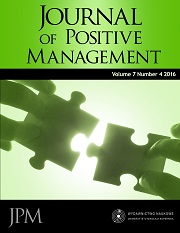POSITIVE LEADERSHIP – ATTEMPT TO CLARIFICATION AND ASSESSMENT OF NOVELTY
DOI:
https://doi.org/10.12775/JPM.2016.023Keywords
positive organizational scholarship, positive leadership, authentic leadership, fundamental state of leadership, positive deviance, transformational leadership, servant leadershipAbstract
Purpose: The paper attempts to clarify the concept of positive leadership. Over the last decade a couple of models of positive leadership have been produced. The paper is purely conceptual its objective is to introduce some order and attempt to clarify what positive leadership really is.
Methodology/approach: The method used in the paper is literature review. The main body of the paper presents three positive leadership concepts: fundamental state of leadership, authentic leadership and positive deviance. They are described and compared along with looking for similarities and causal relationships between them and former leadership concepts: transformational leadership and servant leadership.
Findings: There are quite a few similarities and causal relationships between positive and former leadership concepts: self-awareness that is the fundamental issue in both authentic leadership and fundamental state of leadership is very closely linked to transformational leadership and servant leadership. Moreover, the whole concept of servant leadership is very close to positive way of organizing.
Implications for future research: By introducing some order in the field of positive leadership the paper opens the space for future research that might more accurately address complex relationships of positive leaders.
Value of the paper: Even though positive leadership has received some attention recently, this is the first paper to consider a variety of approaches and to underline the similarities, differences and possible causal relationships among them.
References
Bass, B. (2000), “The future of leadership in learning organizations”, Journal of Leadership Studies, Vol. 7 No. 3, pp. 18–40. DOI: http://dx.doi.org/10.1177/107179190000700302
Bass, B. M. (1985), Leadership and performance beyond expectations, New York: Free Press, New York.
Burns, J. M. (1978), Leadership, New York: Harper & Row, New York.
Cameron, K. S. (2008), Positive leadership. Strategies for extraordinary performance, Berrett Koehler Publishers, Inc., San Francisco.
Cameron, K. S., Dutton, J. E., Quinn, R. E. (2003), Positive organizational scholarship. Foundations of a new discipline, Berrett-Koahler Publishers, Inc., San Francisco.
Greenleaf, R. (1977), Servant-leadership: A journey into the nature of legitimate power and greatness, Paulist Press, New York.
Harter, S. (2002), “Authenticity”, in: Snyder, C. R., Lopez, S. J. (Eds.), Handbook of positive psychology, Oxford University Press, Oxford, pp. 382–394.
Liden, R. C., Wayne, S. J., Zhao, H., Henderson, D. (2008), “Servant leadership: Development of a multidimensional measure and multi-level assessment”, Leadership Quarterly, Vol. 19 No. 2, pp. 161–177. DOI: http://dx.doi.org/10.1016/j.leaqua.2008.01.006
Liden, R. C., Wayne, S. J., Liao, Ch., Meuser, J. D. (2014), “Servant leadership and serving culture: Influence on individual and unit performance”, Academy of Management Journal, Vol. 57 No. 5, pp. 1434–1452. DOI: http://dx.doi.org/10.5465/amj.2013.0034
Lis, A., Glińska-Neweś, A., Kalińska, M. (2014), “The role of leadership in shaping interpersonal relationships in the context of positive organizational scholarship”, Journal of Positive Management, Vol. 5, No. 4, pp. 28–49.
Luthans, F., Avolio, B. (2003), “Authentic leadership development”, in: Cameron, K. S., Dutton, J. E., Quinn, R. E. (Eds.), Positive organizational Scholarship. Foundations of a new discipline, Berrett-Koahler Publishers, Inc., San Francisco, pp. 241–258.
Piccolo, R. F., Colquitt, J. A. (2006), “Transformational leadership and job behaviors: The mediating role of core job characteristics”, Academy of Management Journal, Vol. 49 No. 2, pp. 327–340. DOI: http://dx.doi.org/10.5465/AMJ.2006.20786079
Quinn, R. E. (2005), “Moments of greatness: Entering the fundamental state of leadership”, Harvard Business Review, July-August, pp. 75–83.
Quinn, R. E., Anding, J. M. (2005), “An Interview with Robert E. Quinn Entering the fundamental state of leadership: Reflections on the path to transformational teaching”, Academy of Management Learning & Education, Vol. 4 No. 4, pp. 487–495.
Spreitzer, G. M., Sonenshein, S. (2003), “Positive deviance and extraordinary organizing”, in: Cameron, K. S., Dutton, J. E., Quinn, R. E. (Eds.), Positive organizational Scholarship. Foundations of a new discipline, Berrett-Koahler Publishers, Inc., San Francisco, pp. 207–224.
Spreitzer, G. M., Sonnenschein, S. (2004), “Toward the construct definition of positive deviance”, American Behavioral Scientist, Vol. 47 No. 6, pp. 828–847. DOI: http:// dx.doi.org/10.1177/0002764203260212
Tuhus-Dubrow, R. (2009), “The Power of Positive Deviants: A promising new tactic for changing communities from the inside”, Boston Globe, November, pp. 29–31.
Walumbwa, F. O., Avolio, B. J., Gardner, W. L., Wernsing, T. S., Peterson, S. J. (2007), “Authentic leadership: Development and validation of a theory-based measure”, Journal of Management, Vol. 34, pp. 89–126. DOI: http://dx.doi.org/10.1177/0149206307308913
Zbierowski, P., Góra, K. (2014), “Positive leadership: Its nature, antecedents and consequences”, Journal of Positive Management, Vol. 5 No. 1, pp. 85–99. DOI: http:// dx.doi.org/10.12775/JPM.2014.008
Downloads
Published
How to Cite
Issue
Section
License
Copyright
Articles submitted to the journal should not have been published before in their current or substantially similar form, or be under consideration for publication with another journal. Authors submitting articles for publication warrant that the work is not an infringement of any existing copyright and will indemnify the publisher against any breach of such warranty. For ease of dissemination and to ensure proper policing of use, papers and contributions become the legal copyright of the publisher unless otherwise agreed.
Plagiarism and ghostwriting
In response to the issue of plagiarism and ghostwriting the editors of the Journal of Positive Management has introduced the following rules to counteract these phenomena:
1. Contributors should be aware of their responsibility for a content of manuscripts.
2. Collective authors are obliged to reveal the contribution and an affiliation of each author (i.e. who is an author of specified part of a paper).
3. Any act of dishonesty will be denounced, the editors will inform appropriate institutions about the situation and give evidence of all cases of misconduct and unethical behaviour.
4. The editors may ask contributors for financial disclosure (i.e. contribution of specified institutions).
Stats
Number of views and downloads: 1189
Number of citations: 0



